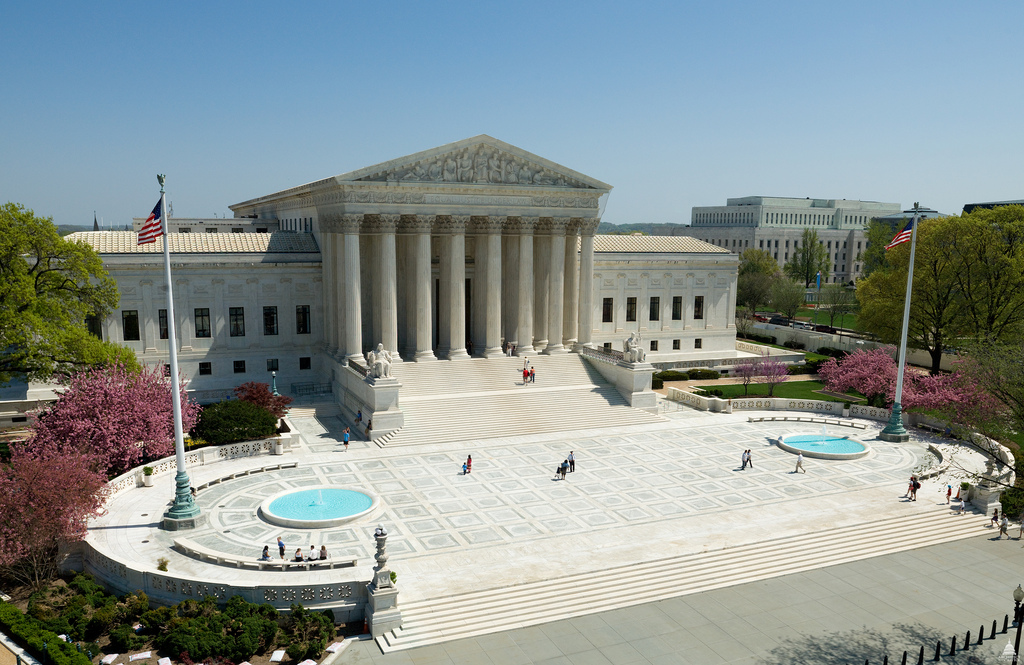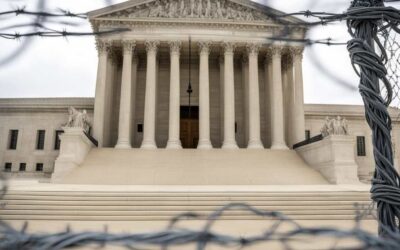The US Supreme Court and Federal Gun Law Cases
Challenges to Federal Gun Laws
the right of the people to keep and bear Arms, shall not be infringed
Updated July 8, 2024
Ratified in 1791, the Second Amendment provides, “A well regulated Militia, being necessary to the security of a free State, the right of the people to keep and bear Arms, shall not be infringed.”
For over 200 years, the Supreme Court remained largely silent on the Second Amendment.
In a series of relatively recent decisions, however, the Court has provided guidance on the substance and scope of the constitutional provision.
District of Columbia v. Heller
In 2008, in District of Columbia v. Heller, the Supreme Court held that the Second Amendment protects an individual right to possess firearms for certain purposes, including at least self-defense in the home.
Facts of the case: Provisions of the District of Columbia Code made it illegal to carry an unregistered firearm and prohibited the registration of handguns, though the chief of police could issue one-year licenses for handguns. The Code also contained provisions that required owners of lawfully registered firearms to keep them unloaded and disassembled or bound by a trigger lock or other similar device unless the firearms were located in a place of business or being used for legal recreational activities.
Question: Do the provisions of the District of Columbia Code that restrict the licensing of handguns and require licensed firearms kept in the home to be kept nonfunctional violate the Second Amendment?
Read more details, court responses and conclusions here District of Columbia v. Heller
McDonald v. City of Chicago
Two years later, in McDonald v. City of Chicago, the Court established that the right to bear arms is a “fundamental” right, applying to laws at all levels of government.
In 2016, in Caetano v. Massachusetts, the Court in a brief opinion clarified that “arms” within the meaning of the Second Amendment encompass modern arms, including stun guns, that did not exist at the time of the founding.
Facts of the case: Several suits were filed against Chicago and Oak Park in Illinois challenging their gun bans after the Supreme Court issued its opinion in District of Columbia v. Heller. In that case, the Supreme Court held that a District of Columbia handgun ban violated the Second Amendment.
There, the Court reasoned that the law in question was enacted under the authority of the federal government and, thus, the Second Amendment was applicable.
Plaintiffs argued that the Second Amendment should also apply to the states, with the district court dismissing the suits. The U.S. Court of Appeals for the Seventh Circuit affirmed on appeal.
Question: Is the Second Amendment applicable to the states through incorporation by the Fourteenth Amendment’s Privileges and Immunities or Due Process clauses, thereby extending its reach to state jurisdictions?
Read more details, court responses and conclusions here McDonald v. City of Chicago
New York State Rifle & Pistol Association v. Bruen
In 2022, the Supreme Court in New York State Rifle & Pistol Association v. Bruen resolved two of the questions left open following Heller and McDonald:
Does the right to bear arms extend beyond the home, and how are courts to assess purported infringements of the right?
In Bruen, the Court established that the Second Amendment safeguards apply outside the home and specified the criteria for evaluating challenges to firearm laws:
When the plain text of the Second Amendment covers the regulated conduct, the Constitution presumptively protects it; to justify a regulation of that conduct, the government must demonstrate that a challenged law is consistent with the nation’s historical tradition of firearm regulation.
Facts of the case: The clowns of New York require a person to show a special need for self-protection to receive an unrestricted license to carry a concealed firearm outside the home.
Robert Nash and Brandon Koch challenged the law after New York rejected their concealed-carry applications based on failure to show “proper cause.” A district court dismissed their claims, and the U.S. Court of Appeals for the Second Circuit affirmed.
Question: Does New York’s law requiring that applicants for unrestricted concealed-carry licenses demonstrate a special need for self-defense violate the Second Amendment?
Read more details, court responses and conclusions here New York State Rifle & Pistol Association v. Bruen
Following Bruen, parties have initiated several legal challenges contesting different firearm laws and regulations, such as federal categorical restrictions on firearm possession.
United States v. Rahimi
In 2024, the Supreme Court held in United States v. Rahimi that one such prohibition, 18 U.S.C. § 922(g)(8), which applies to persons subject to certain domestic-violence restraining orders, is generally consistent with the Second Amendment.
The Court determined that sufficient historical support existed for the principle that “[w]hen an individual poses a clear threat of physical violence to another, the threatening individual may be disarmed” temporarily.
Facts of the case: Between December 2020 and January 2021, Zackey Rahimi was involved in a series of violent incidents in Arlington, Texas, including multiple shootings and a hit-and-run.
Rahimi was under a civil protective order for alleged assault against his ex-girlfriend, which explicitly prohibited him from possessing firearms.
Police searched his home and found a rifle and a pistol, leading to Rahimi’s indictment for violating federal law 18 U.S.C. § 922(g)(8), which makes it unlawful for someone under a domestic violence restraining order to possess firearms. Rahimi moved to dismiss the indictment on constitutional grounds but was denied, as his argument was foreclosed by United States v. McGinnis, 956 F.3d 747 (5th Cir. 2020).
Rahimi pleaded guilty but continued his constitutional challenge on appeal. As the appeal was pending, the U.S. Supreme Court decided New York State Rifle & Pistol Association, Inc. v. Bruen, 579 U.S. __ (2022). Rahimi argued that Bruen overruled McGinnis and thus that § 922(g)(8) was unconstitutional, and the U.S. Court of Appeals for the Fifth Circuit agreed.
Question: Does 18 U.S.C. § 922(g)(8), which prohibits the possession of firearms by persons subject to domestic-violence restraining orders, violate the Second Amendment?
Read more details, court responses and conclusions here United States v. Rahimi
Legal Counsel and Your Rights
When facing legal challenges, particularly in criminal cases, it is advisable to seek legal counsel immediately.
An experienced attorney can provide guidance on how to navigate interactions with law enforcement while safeguarding your constitutional rights.
Since 1993 our expert legal defense in navigating criminal law matters and protecting your constitutional rights are what we eat for breakfast everyday.
Contact Komorn Law PLLC if you’re ready to fight and win.
Research us and then call us.
CONSTITUTION OF MICHIGAN OF 1963
§ 11 Searches and seizures.
Sec. 11.
The person, houses, papers, possessions, electronic data, and electronic communications of every person shall be secure from unreasonable searches and seizures. No warrant to search any place or to seize any person or things or to access electronic data or electronic communications shall issue without describing them, nor without probable cause, supported by oath or affirmation.
The provisions of this section shall not be construed to bar from evidence in any criminal proceeding any narcotic drug, firearm, bomb, explosive or any other dangerous weapon, seized by a peace officer outside the curtilage of any dwelling house in this state.
History: Const. 1963, Art. I, § 11, Eff. Jan. 1, 1964 ;– Am. S.J.R. G, approved Nov. 3, 2020, Eff. Dec. 19, 2020
Constitutionality: The last sentence of this section was held invalid as in conflict with US Const, Am IV. Lucas v People, 420 F2d 259 (CA 6, 1970); Caver v Kropp, 306 F Supp 1329 (DC Mich 1969); People v Pennington, 383 Mich 611; 178 NW2d 460 (1970); People v Andrews, 21 Mich App 731; 176 NW2d 460 (1970).
Former Constitution: See Const. 1908, Art. II, § 10.
Recent

The “Automobile Exception” in Michigan law
The "automobile exception" in Michigan law allows police to search a vehicle without a warrant if they have probable cause to believe it contains evidence of a crime.This exception is grounded in the idea that vehicles are inherently mobile, meaning evidence could be...

SCOTUS Decision Gives Starbucks a Win in Labor Dispute
The decision underscored the principle that only activities that are essential and directly related to an employee's primary job responsibilities are subject to compensation. In a recent decision by the Supreme Court of the United States (SCOTUS), Starbucks received a...
Other Articles
Supreme Court Opinion – Created federal agencies need judicial oversight
Summary of the Opinion in Loper Bright Enterprises v. RaimondoIn Loper Bright Enterprises v. Raimondo, the Supreme Court addressed the enduring precedent set by Chevron U.S.A., Inc. v. Natural Resources Defense Council, Inc., which has shaped administrative law for...
Carjacking is a Federal Offense
Carjacking is a Federal OffenseCarjacking, the act of forcibly stealing an occupied vehicle, has long been a concern for public safety. It was a local and state issue until a series of violent incidents in the early 1990s that carjacking became a federal...
SCOTUS: No separate hearing required when police seize cars loaned to drivers accused of drug crimes
SCOTUS: When police seize cars loaned to drivers accused of drug crimes it does not necessitate a separate preliminary hearing.The U.S. Supreme Court has ruled against two women who loaned their cars to others arrested for drug crimes while using the vehicles, leading...
SCOTUS Opinion, SHEETZ v. COUNTY OF EL DORADO, CALIFORNIA
The Constitution provides “no textual justification for saying that the existence or the scope of a State’s power to expropriate private property without just compensation varies according to the branch of government effecting the expropriation.”The case in question...
















